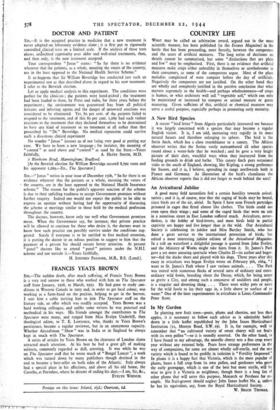DOCTOR AND PATIENT
SIR,—It is the accepted practice in medicine that a new treatment is never adopted on laboratory evidence alone ; it is first put to rigorously controlled clinical tests on a limited scale. If the analysis of these tests shows undoubted superiority over older and well-tried treatments, then, and then only, is the new treatment accepted. Your correspondent " Janus " states: " So far there is no evidence whatever that the patients, as a whole, meaning the voters of the country, are in the least opposed to the National Health Service Scheme." It so happens that Sir William Beveridge has conducted just such an experimental test as that described at ove in regard to his new treatment. I refer to the Berwick election. Let us apply medical analysis to this experiment. The conditions were perfect for the clinician ; the patients were hand-picked ; the -treatment had been lauded to them, by Press and radio, for three years before the experiment ; the environment was guaranteed free from all political irritants and infecting agents and the danger of untoward reactions was considered to be eliminated. Yet, 8o per cent. of the patients failed to respond to the treatment, and of this 8o per cent. 1,269 had such violent reactions to the treatment that they declared themselves to be determined to have any kind of treatment or no treatment at all rather than that prescribed by " Dr." Beveridge. No medical reputation could survive such a disastrous clinical experiment No wonder " Janus" accuses us of not 1.eing very good at putting our case. We have to learn a new language ; for instance, the meaning of " control " as used above and "control " as used by the State.—Yours [At the Berwick election Sir William Beveridge secured 8,792 votes and his opponent t,269..—ED., The Spectator.]


























 Previous page
Previous page